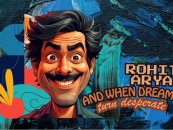-853X543.jpg)
BUSINESS: THE MANUFACTURED KISS
by Sohaila Kapur March 22 2024, 12:00 am Estimated Reading Time: 5 mins, 21 secsIt’s Sohaila Kapur today, in conversation with Neha Vyaso, an Intimacy Director in Bollywood. “She’s the first of her kind,” writes the interviewer.
Neha Vyaso is an Intimacy Director in Bollywood. She’s the first of her kind. This position was brought in during the MeToo movement in India. Vyaso trained in Hollywood for it and brought it to India, where eight of her students are now practising in Bollywood. Sohaila Kapur interviews her during one of her assignments.
How did you first get into the field?
I actually first heard about intimacy choreography during my training with Ben Crystal at The Prague Shakespeare Company. I found the work very empowering as an actor, and I wanted to bring it to India. A lot of the work and training for intimacy is driven by the west, I wanted to contextualise the work for our culture so I started using my training as an actor and my study and experience of the work to build a practice which I used in work that I created. Shakun saw my work and brought me on board for Gehraiyaan, which became my first big project of sorts where I also met Daria Gai, the credit for my continuing to pursue the work rests with Dar. At a time when nobody in the industry was really talking about it, she encouraged me to do the work and build my own practice.
Are there many intimacy directors and coordinators in Bollywood and do you need training to become one?
Yes, there are a very small number of Intimacy Coordinators (ICs) in India and a lot of the training is influenced and driven by the West. A solid training and some global mandates for intimacy work are critical for anyone wanting to pursue this as a career.
I trained with Intimacy Directors and Coordinators in New York, where Alicia Rodis, the lead of intimacy work at HBO, and Claire Warden, both pioneers of intimacy work trained me. I travelled to do in-person training in New York. It was a very extensive training module and helped me expand my approach to the work. Alicia and Claire kept reminding me to contextualise the work to India, which is why I also started creating workshop modules for actors, directors, and production houses.
Do you think the #MeToo movement created this position?
Yes. Absolutely, I think the major credit for this long overdue space is for the people who championed the cause of actor safety and consent based performance practices.
There’s an Intimacy Professionals Association (IPA) in Hollywood, where they have agents representing intimacy directors and coordinators. The association also provides training to them.
Is there any such organisation in Bollywood?
I have started building an organisation called Brave Spaces, and am hoping to create specific modules that we need in India. IPA also has a tie up with The Intimacy Lab here, which has seven IC’s represented by them.
My approach to the work is towards Intimacy Direction. I believe that in India, the work needs to go beyond just safety and protocols. I like to focus on workshops as prep towards building scenes of intimacy.
20.jpg)
Were you ever at your wits’ about any scene; or doubted your ability to choreograph it?
Actually my training as an actor in the Eric Morris system and my movement-based work had my back. I have never really struggled with the work - sometimes with the acceptance of the work.
In Hollywood Intimacy directors and coordinators are paid anywhere between USD 1100 to 1400 a day. How much are their Indian counterparts paid?
We are still working towards making this work be seen and accepted as an integral part of the filmmaking process. Some production houses and directors have been very forthcoming and supportive. However, when it comes to payments, there is still a long way to go for us.
After initially agreeing to do an intimate scene, has any actor got cold feet and refused to do it, when faced with your workshops?
More often than not the workshops we conduct for our actors have enabled them with a better understanding of their own boundaries and the knowledge that their consent is crucial to the process. The mere fact that they have agency of their own has brought about a shift in how they perceive scenes of intimacy and it allows them to have more confidence in themselves. So once we've had that conversation started, we get into specifics of what they're okay with and not okay with in order to ensure efficiency on set.
What can an actor do to feel comfortable during a scene involving nudity and sex?
I feel it all begins with having an understanding of one's own boundaries and barriers. To be able to feel comfortable and confident during scenes of nudity and intimacy, it is very important to be in tune with our own bodies and the knowledge that it's okay to say No when one is not okay with something.
Has any director feared you may change the dynamics of the scene by giving the actor mechanical movements that makes them feel safe, but takes the passion out of it?
I feel it's only natural for directors to operate from a sense of apprehension because not many creators are aware of what we bring to the table or how we do our work. And so, many times it does become about educating and empowering teams we work with and making them see the value. Luckily for me, most directors I've worked with over the last few years have not only appreciated the work but have also become advocates, and have chosen to spread word about it in their own way.
Which have been your best and worst moments in this job?
I love my work as an actor and that’s why when I get to be behind the scenes as an intimacy director. To bring alive a scene, it’s always amazing. I don’t really think of anything as a worst moment on the job, because every moment that seems like failure, I like to treat as a learning curve and opportunity to grow.
It’s a line of work that we are embracing as an industry and growing together. I really don’t want to box it in binaries.




-173X130.jpg)
-173X130.jpg)
-173X130.jpg)
-173X130.jpg)

-173X130.jpg)

-173X130.jpg)